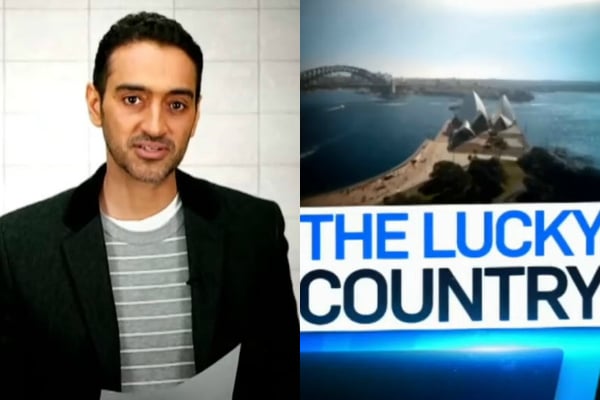
The coverage of COVID-19 can feel all-consuming at the moment.
With daily death tolls and ever-changing updates dominating the news, it’s hard to block out the noise and make sense of what’s important.
So, if there’s one thing you watch about COVID-19 today, make it this video from The Project.
You can watch a snippet of Waleed Aly’s monologue about Australia’s coronavirus situation on The Project in this video below. Post continues after video.
On Wednesday night, The Project co-host Waleed Aly delivered a video segment titled ‘Australia, The Lucky Country’.
It served as a humbling reminder that all of us living in Australia, with our own individual and varying struggles, are indeed the lucky ones amid this global pandemic.
The five-minute monologue clearly outlined just five of the reasons Australia’s COVID-19 situation is less dire than many other countries – why our nation has tragically lost 51 lives, compared to nearly 18,000 in Italy and 13,000 in the US.
In Australia, we are lucky we’re an island nation geographically distanced from the rest of the world.
As Aly pointed out, “Regions like Europe aren’t so lucky. After the virus took hold in Italy, it wasn’t long before the nightmare spread, with cases soaring in Germany, France, the UK and worst of all, Spain.”

Top Comments
Australia, New Zealand and most of the South Pacific islands thus far seem to be doing relatively well. Sometimes being an island is an advantage.
The WHO rates Spain and Italy’s health systems above ours, but anything from the WHO at the moment has an asterisk next to it. They seem to have got virtually every call wrong on this and unlike politicians, they are supposed to be the authority on pandemics and all matters related to health.
It’s pleasing to see the infection curve continuing to flatten and the uptick in recoveries. Maybe she’ll be right.
Italy's healthcare system is very similar to that of Australia's. I'd say they're on a par (having worked in both). I think Italy is slightly ahead with ventilated beds per capita, but it's only a marginal difference either way. This should come as a warning to Australia: the public healthcare system that we have, as wonderful as it is, has a finite capacity. Once that capacity reached, doesn't matter how fantastic the people and resources are within it - outcomes become terrible. Think of Italy as an illustration of what could happen in Australia when the elastic in the system snaps.
Very true. It confronts us with the maths problem of calculating risk based on extremely low probability, extremely high disutility events. One example being a terrorist incident with a nuclear weapon. Even a small one in any city would overload our entire medical system or on a global scale, an event where a big asteroid is on course to collide with us. The costs to fully hedge against either are massive so what policy response do you go with? Those who subscribe to AGW often site the precautionary principle in responding to climate change, but then run quickly into resistance at the extreme cost of measures that would actually cool the earth reliably.
It’s a maths problem quants and actuarials continue to work on.
I disagree with Waleed Aly on practically everything. But what he said here was 100% correct.
You might agree with him more than you think. I don't want to make assumptions about you, but many people base their opinion of Waleed on the things he says that makes headlines. Most nights he is a very middle of the road small l liberal.